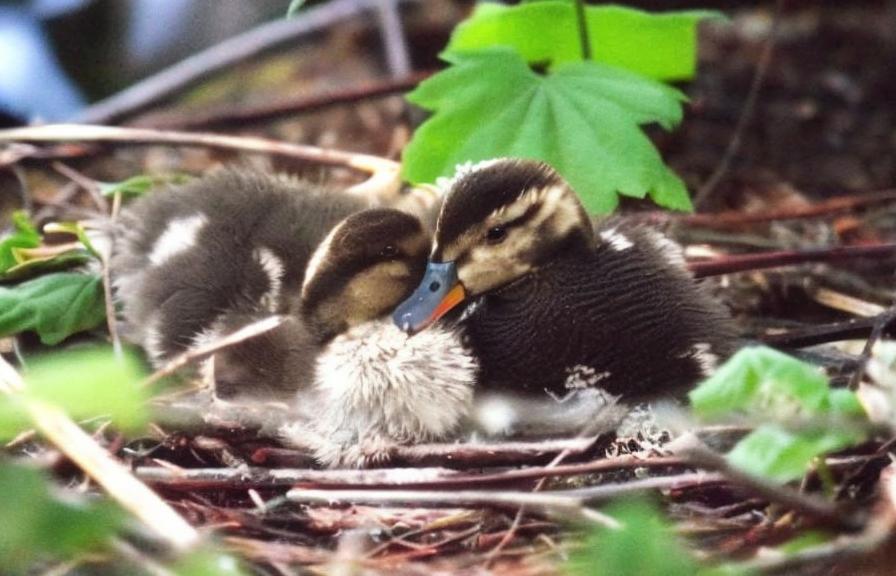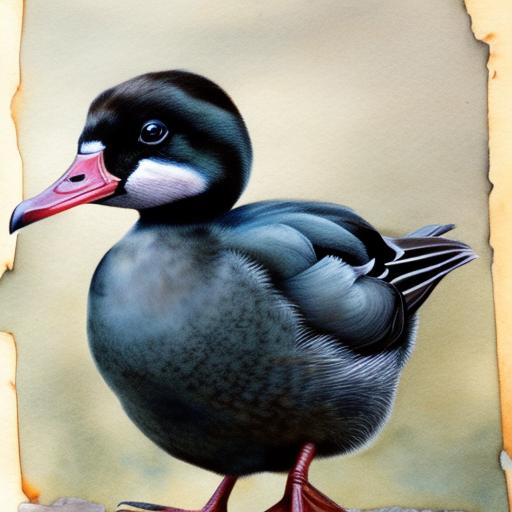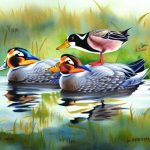Baby black duck breeds are a popular choice for many bird enthusiasts due to their striking appearance and charming personalities. These adorable creatures are a joy to watch as they waddle around and splash in the water. Black ducks are known for their glossy black feathers, which give them a sleek and elegant appearance. They are also characterized by their bright orange feet and beaks, which add a pop of color to their overall look. Baby black duck breeds are a delight to raise and care for, making them a favorite among bird lovers.
Black ducks are a type of dabbling duck, which means they feed by tipping forward in the water to reach food, rather than diving below the surface. This makes them a great addition to any pond or water feature, as they will happily forage for insects, plants, and small fish. Baby black duck breeds are also known for their friendly and sociable nature, making them a wonderful choice for those looking to add a touch of charm to their backyard or farm. Whether you’re a seasoned duck owner or considering adding these delightful creatures to your flock for the first time, baby black duck breeds are sure to bring joy and entertainment to your life.
Key Takeaways
- Baby black duck breeds come in a variety of sizes and shapes, each with its own unique characteristics and traits.
- Baby black duck breeds are known for their glossy black feathers and often have a friendly and sociable nature.
- Common varieties of baby black duck breeds include the Cayuga, East Indie, and Swedish ducks, each with its own distinct features.
- Caring for baby black duck breeds involves providing a suitable living environment, proper nutrition, and regular health check-ups.
- Breeding and reproduction of baby black duck breeds require careful planning and consideration of factors such as genetics and nesting conditions.
Characteristics of Baby Black Duck Breeds
Baby black duck breeds are known for their striking appearance and charming personalities. These adorable creatures have glossy black feathers that give them a sleek and elegant look. They also have bright orange feet and beaks, which add a pop of color to their overall appearance. Baby black duck breeds are medium-sized ducks, with males typically weighing around 2-3 pounds and females weighing slightly less. They have a compact, rounded body shape and a slightly upturned tail, giving them a distinctive silhouette.
In addition to their physical characteristics, baby black duck breeds are also known for their friendly and sociable nature. They are generally easy to handle and enjoy interacting with their human caretakers. Black ducks are also known for their vocalizations, with males producing a distinctive “quack” sound and females emitting a softer, raspy call. These charming creatures are a joy to watch as they waddle around and splash in the water, making them a popular choice for bird enthusiasts of all ages.
Common Varieties of Baby Black Duck Breeds
There are several common varieties of baby black duck breeds, each with its own unique characteristics and traits. The most well-known variety is the American black duck, which is native to North America and is often found in wetland habitats such as marshes, ponds, and rivers. This variety is known for its glossy black feathers and bright orange feet and beak. Another popular variety is the East Asian black duck, which is found in countries such as China, Japan, and Korea. This variety is similar in appearance to the American black duck but may have slight variations in coloration and markings.
In addition to these two main varieties, there are also several domesticated breeds of black ducks that are popular among bird enthusiasts. These include the Cayuga duck, which is known for its iridescent greenish-black feathers, and the Swedish black duck, which has a more upright body posture and distinctive white markings on its wings. Each variety of baby black duck breeds has its own unique charm and appeal, making them a delightful addition to any flock or collection of waterfowl.
Caring for Baby Black Duck Breeds
Caring for baby black duck breeds requires careful attention to their housing, diet, and overall well-being. These delightful creatures thrive in outdoor environments with access to water for swimming and foraging. A pond or water feature is ideal for baby black duck breeds, as it allows them to engage in natural behaviors such as dabbling for food and splashing in the water. It’s important to provide adequate shelter and protection from predators, as well as access to fresh food and clean water at all times.
In terms of diet, baby black duck breeds require a balanced diet that includes a mix of commercial waterfowl feed, fresh greens, and occasional treats such as mealworms or cracked corn. It’s important to monitor their food intake and adjust portions as needed to prevent obesity or malnutrition. Regular health check-ups by a qualified avian veterinarian are also essential to ensure that baby black duck breeds remain healthy and free from illness or disease. With proper care and attention, baby black duck breeds can live long and happy lives, bringing joy and entertainment to their human caretakers.
Breeding and Reproduction of Baby Black Duck Breeds
Breeding baby black duck breeds can be a rewarding experience for bird enthusiasts who are interested in expanding their flock or raising ducklings. Black ducks typically reach sexual maturity at around 1-2 years of age, at which point they may begin to display courtship behaviors such as preening, head bobbing, and vocalizations. Mating usually occurs in the spring or early summer, with females laying a clutch of 8-10 eggs in a well-hidden nest near water.
It’s important to provide a safe and secure nesting area for breeding black ducks, as well as access to plenty of fresh water and nutritious food to support the female during the egg-laying process. Incubation typically lasts around 25-30 days, after which the ducklings will hatch and begin to explore their surroundings under the watchful eye of their mother. It’s important to provide a warm and safe environment for the ducklings to grow and develop, as well as access to appropriate food and water for their nutritional needs. With proper care and attention, breeding baby black duck breeds can be a fulfilling experience that allows you to witness the miracle of new life firsthand.
Health and Wellness of Baby Black Duck Breeds

Maintaining the health and wellness of baby black duck breeds is essential for ensuring that they live long and happy lives. Regular health check-ups by a qualified avian veterinarian are important for monitoring their overall well-being and addressing any potential health concerns. It’s also important to provide a clean and safe environment for baby black duck breeds, with access to fresh water for swimming and foraging, as well as shelter from extreme weather conditions.
In addition to physical health, it’s important to consider the mental and emotional well-being of baby black duck breeds. These sociable creatures thrive on interaction with their human caretakers and benefit from enrichment activities such as floating toys in their pond or supervised free-range time in a secure outdoor area. Providing a stimulating environment that allows baby black duck breeds to engage in natural behaviors such as dabbling for food and socializing with other ducks is essential for promoting their overall wellness.
Conclusion and Considerations for Baby Black Duck Breeds Ownership
In conclusion, baby black duck breeds are delightful creatures that bring joy and entertainment to bird enthusiasts of all ages. Their striking appearance, charming personalities, and sociable nature make them a popular choice for those looking to add a touch of charm to their backyard or farm. Caring for baby black duck breeds requires attention to their housing, diet, and overall well-being, as well as regular health check-ups by a qualified avian veterinarian.
Breeding baby black duck breeds can be a rewarding experience that allows you to witness the miracle of new life firsthand. However, it’s important to provide a safe and secure environment for breeding ducks, as well as access to plenty of fresh water and nutritious food to support the female during the egg-laying process. Maintaining the health and wellness of baby black duck breeds is essential for ensuring that they live long and happy lives, with regular health check-ups by a qualified avian veterinarian being an important aspect of their care.
Overall, baby black duck breeds are a delightful addition to any flock or collection of waterfowl, bringing joy and entertainment to their human caretakers while enriching the natural environment around them. If you’re considering adding these charming creatures to your life, it’s important to carefully consider their housing, diet, breeding needs, and overall well-being to ensure that they thrive in your care. With proper attention and care, baby black duck breeds can bring years of happiness and fulfillment to those who choose to welcome them into their lives.
If you’re considering raising baby black duck breeds, it’s essential to provide them with a safe and comfortable environment. Insulating your chicken coop is crucial for maintaining a suitable temperature for the ducks, especially during colder months. Poultry Wizard offers a helpful guide on how to insulate a chicken coop, which can be adapted to create a cozy space for your ducklings. Additionally, their article on farmhouse chicken coop design may provide inspiration for creating a functional and aesthetically pleasing home for your baby black ducks.
FAQs
What are the different breeds of baby black ducks?
There are several breeds of black ducks, including the Black Swedish, Cayuga, and East Indie.
What are the characteristics of baby black duck breeds?
Baby black duck breeds typically have black feathers, orange or yellow bills, and orange or brown eyes. They are known for their calm and friendly temperament.
What is the average size of baby black duck breeds?
Baby black duck breeds can vary in size, but they generally grow to be medium-sized ducks, with males being slightly larger than females.
What type of environment do baby black duck breeds thrive in?
Baby black duck breeds thrive in a variety of environments, including ponds, lakes, and marshes. They require access to water for swimming and foraging.
What do baby black duck breeds eat?
Baby black duck breeds are omnivores and eat a diet that consists of aquatic plants, insects, small fish, and crustaceans. They may also be fed commercial duck feed.
Meet Walter, the feathered-friend fanatic of Florida! Nestled in the sunshine state, Walter struts through life with his feathered companions, clucking his way to happiness. With a coop that’s fancier than a five-star hotel, he’s the Don Juan of the chicken world. When he’s not teaching his hens to do the cha-cha, you’ll find him in a heated debate with his prized rooster, Sir Clucks-a-Lot. Walter’s poultry passion is no yolk; he’s the sunny-side-up guy you never knew you needed in your flock of friends!







